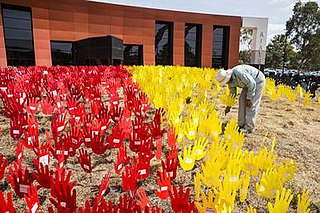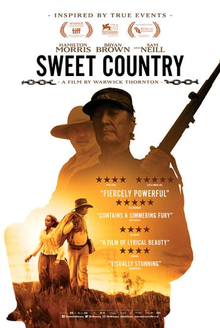Related Research Articles

The culture of Australia is primarily a Western culture, originally derived from Britain but also influenced by the unique geography of Australia and the cultural input of Aboriginal, Torres Strait Islander and other Australian people. The British colonisation of Australia began in 1788, and waves of multi-ethnic migration followed. Evidence of a significant Anglo-Celtic heritage includes the predominance of the English language, the existence of a democratic system of government drawing upon the British traditions of Westminster government, parliamentarianism and constitutional monarchy, American constitutionalist and federalist traditions, and Christianity as the dominant religion.

The Australian Institute of Aboriginal and Torres Strait Islander Studies (AIATSIS), established as the Australian Institute of Aboriginal Studies (AIAS) in 1964, is an independent Australian Government statutory authority. It is a collecting, publishing and research institute and is considered to be Australia's premier resource for information about the cultures and societies of Aboriginal and Torres Strait Islander peoples. The institute is a leader in ethical research and the handling of culturally sensitive material and holds in its collections many unique and irreplaceable items of cultural, historical and spiritual significance. The collection at AIATSIS has been built through over 50 years of research and engagement with Aboriginal and Torres Strait Islander communities and is now a source of language and culture revitalisation, native title research and family and community history. AIATSIS is located on Acton Peninsula in Canberra, Australian Capital Territory.

Emily Kame Kngwarreye was an Aboriginal Australian artist from the Utopia community in the Northern Territory. She is one of the most prominent and successful artists in the history of Australian art.

Robert Tudawali, also known as Bobby Wilson and Bob Wilson, was an Australian actor and Indigenous activist. He is known for his leading role in the 1955 Australian film Jedda, which made him the first Indigenous Australian film star, and also his position as Vice-President of the Northern Territory Council for Aboriginal Rights.
Australian Aboriginal astronomy is a name given to Aboriginal Australian culture relating to astronomical subjects – such as the Sun and Moon, the stars, planets, and the Milky Way, and their motions on the sky.

Yannima Tommy Watson known as Tommy Watson was an Indigenous Australian artist, of the Pitjantjatjara people from Australia’s central western desert. He was described by one critic as "the greatest living painter of the Western Desert".

Smoking ceremony is an ancient and contemporary custom among some Aboriginal Australians that involves smouldering native plants to produce smoke. This herbal smoke is believed to have both spiritual and physical cleansing properties, as well as the ability to ward off bad spirits. In traditional, spiritual culture, smoking ceremonies have been performed following either childbirth or initiation rites involving circumcision. In contemporary culture, elements of smoking ceremonies have been incorporated into Welcome to Country performances and other spiritual events held for the general public.
Australia traditional storytelling, handed down from generation to generation, has always been part of the landscape. Since the beginning of time storytelling played a vital role in Australian Aboriginal culture, one of the world's oldest cultures. Aboriginal children were told stories from a very early age; stories that helped them understand the air, the land, the universe, their people, their culture, and their history. Elders told stories of their journeys and their accomplishments. As the children grew into adults they took on the responsibility of passing on the stories. These stories are as much a cultural necessity as they are entertainment and are still passed on orally though many are now recorded in print, audio and video

The Mount Emu Creek, a perennial creek of the Glenelg Hopkins catchment, is located in the Western District of Victoria, Australia.

Ray Norris is an astrophysicist and science communicator, based at the CSIRO Australia Telescope National Facility, and Western Sydney University, and conducts research in astrophysics and Aboriginal Astronomy.
Stephen Muecke BA, Mes.L (Paris), PhD (UWA) FAHA is Emeritus Professor of Ethnography at the University of New South Wales, Australia and Adjunct Professor at the Nulungu Institute, University of Notre Dame, Broome. He studied linguistics and semiotics, completing his PhD on storytelling techniques among Aboriginal people in Broome, Western Australia.
Martha Ansara is a documentary filmmaker whose films on social issues have won international prizes and been screened in Australia, the UK, Europe and North America. Ansara was one of the first women in Australia to work as a cinematographer, is a full member of the Australian Cinematographers Society (ACS) and was inducted into the ACS Hall of Fame in 2015. Martha is a Life Member of the Australian Directors Guild and a founding member of Ozdox, the Australian Documentary Forum. She has also worked as a film lecturer and film writer and has been active in the trade union, women's and peace movements.

Redfern Now is an Australian drama television series, that first aired on ABC1 in 2012. The program follows the lives of 6 Aboriginal Australian families living in the urban hub of Redfern, Sydney. The series provides insight into contemporary issues facing Aboriginal Australians, including lack of employment and mental illness, which are positioned as direct ramifications of colonialisation and the Stolen Generations. Produced by Blackfella Films as part of the ABC's Indigenous Department, the show is the first series to be 'commissioned, written, acted and produced by Indigenous Australians'. The series' release contributes to widespread public debate surrounding Indigenous representation in the Australian media.
Alex Kelly is an Australian freelance artist, filmmaker and producer based in regional Australia. Kelly was born in regional NSW and grew up in a farming community near Wodonga in regional Victoria,
FORM is a Western Australian arts organisation that delivers programming tailored to specific communities throughout the State.
The Wangaaypuwan, also known as the Wangaibon or Ngiyampaa Wangaaypuwan, are an Aboriginal Australian people who traditionally lived between Nyngan, the headwaters of Bogan Creek, and on Tigers Camp and Boggy Cowal creeks and west to Ivanhoe, New South Wales. They are a clan of the Ngiyampaa nation.
NEOMAD is a 3-episode futuristic fantasy adventure series, created as part of a governmentally supported community art project. The comic brings together live action film, with animation, music and voice overs. The series was created with the community of Roebourne, Western Australia as part of art and social justice organisation, Big hART and their Yijala Yala Project.

Sweet Country is a 2017 Australian drama film, directed by Warwick Thornton. Set in 1929 in the sparsely populated outback of the Northern Territory and based on a series of true events, it tells a harsh story against the backdrop of a divided society in the interwar period in Australia.

Dark Emu: Black Seeds: Agriculture or Accident? is a 2014 non-fiction book by Bruce Pascoe. It reexamines colonial accounts of Aboriginal people in Australia, and cites evidence of pre-colonial agriculture, engineering and building construction by Aboriginal and Torres Strait Islander peoples. A second edition, published under the title Dark Emu: Aboriginal Australia and the Birth of Agriculture was published in mid-2018, and a version of the book for younger readers, entitled Young Dark Emu: A Truer History, was published in 2019.

Yued is a region inhabited by the Yued people, one of the fourteen groups of Noongar Aboriginal Australians who have lived in the South West corner of Western Australia for approximately 40,000 years.